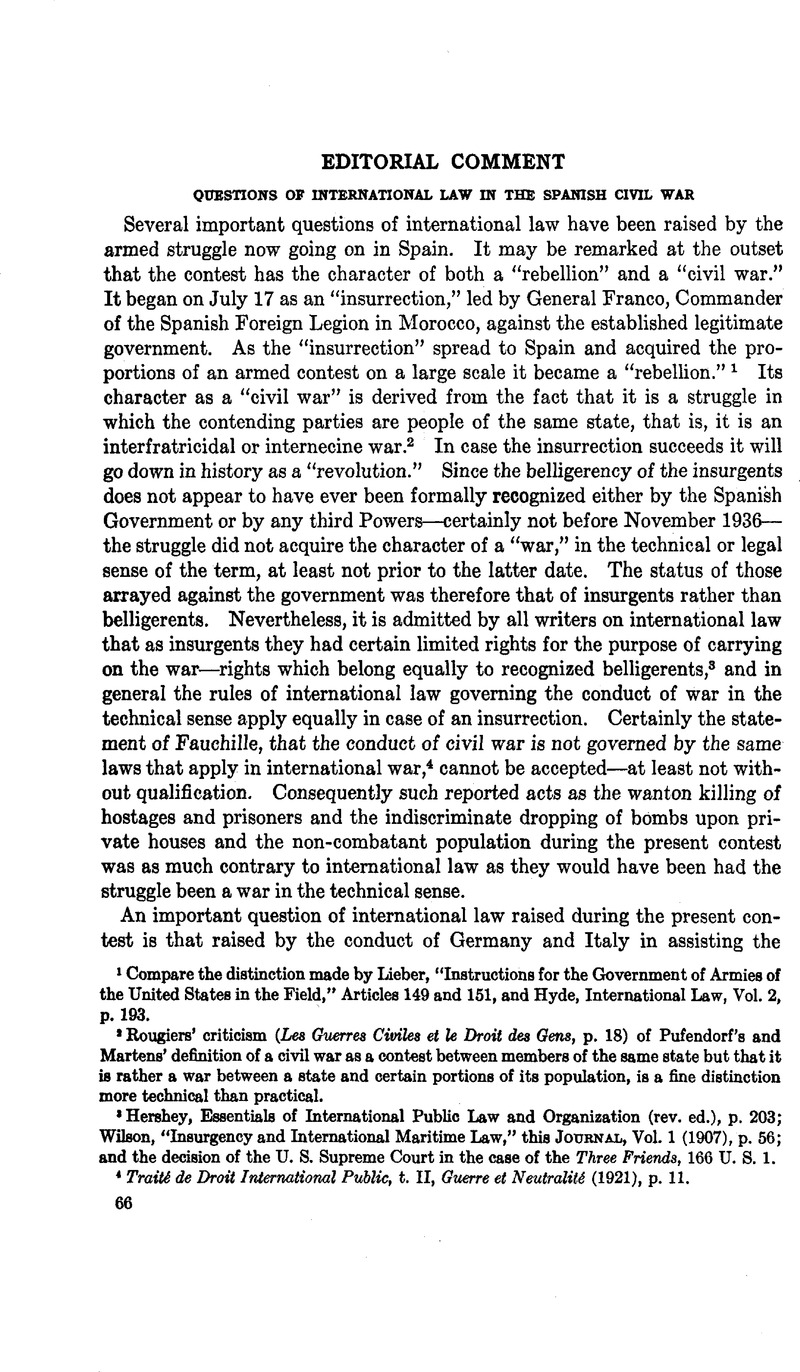Published online by Cambridge University Press: 12 April 2017

1 Compare the distinction made by Lieber, , “Instructions for the Government of Armies of the United States in the Field,” Articles 149 and 151, and Hyde, International Law, Vol. 2, p. 193.Google Scholar
2 Rougiers’ criticism (Les Guerres Civiles et le Droit des Gens, p. 18) of Pufendorf’s and Martens’ definition of a civil war as a contest between members of the same state but that it is rather a war between a state and certain portions of its population, is a fine distinction more technical than practical.
3 Hershey, , Essentials of International Public Law and Organization (rev. ed.), p. 203 Google Scholar; Wilson, , “Insurgency and International Maritime Law,” this JOURNAL, VOL 1 (1907), p. 56; and the decision of the U. S. Supreme Court in the case of the Three Friends, 166 U. S. 1 Google Scholar.
4 Traitè de Droit International Public, t. II, Guerre et Neutralité (1921), p. 11.
5 18 Annuaire de l’Institut, p. 227.
6 Les Gens Guerres Civiles et le Droit des (1903). See p. 83 ff. where the whole matter is discussed in great detail.
7 2 International Law, p. 782.
8 2 International Law (5th ed.), p. 524.
9 Le Droit International Appliguè aux Guerres Civiles (1898).
10 “La reconnaissance du belligerance dans les Guerres Civiles,” 3 Revue G4n4rale de Droit International Public (1896), p. 277 ff.
11 International Law Codified (trans. by Borchard, ), Sec. 1468.Google Scholar
11a Les Evenements d’Espagne,” 18 Revue de Droit International (July—Sept., 1936), p. 165 ff.
12 Dispatch to Burton, Mr., Oct. 25, 1862. 6 Moore, Digest of International Law, p. 20. See also the strong statement of Charles Francis Adams to Earl Russell in 1865 (1 ibid., p. 188) where he said among other things “Whenever an insurrection against the established government of a country takes place, the duty of governments . . . appears to be, at first, to abstain carefully from any step that may have the smallest influence in affecting the result.” Google Scholar
13 Text in New York Times, Aug. 23, 1936.
14 See a statement of the conditions which are deemed to justify recognition of belligerency, as formulated by the Institute of International Law in its NeuchAtel projet, 18 Annuaire, p. 229; Rougier, op. cit., p. 384, and Hershey, , op. cit., p. 203.Google Scholar
15 As to these tests, see Hershey, , op. cit., p. 207 ff.Google Scholar
15a Text in New York Times, Nov. 28, 1936.
16 New York Times, Nov. 19 and 20.
17 Text in New York Times, Aug. 27, 1936, p. 2.
18 Note of Nov. 18, 1834, of Mr. Forsyth to Chevalier Tacon. 7 Moore, Digest, p. 803.
19 Ibid., p. 797 ff.
20 2 Hyde, op. cit., p. 647 ff.; 2 Oppenheim, op. cit., p. 635 ff.; and Garner, Prize Law During the World War, p. 625 (for a summary of the jurisprudence).
21 Hershey, , op. cit., p. 207, and 1 Moore, Digest, p. 184 ffGoogle Scholar.